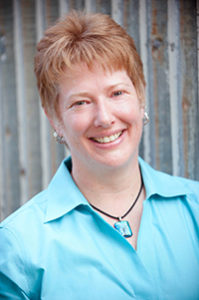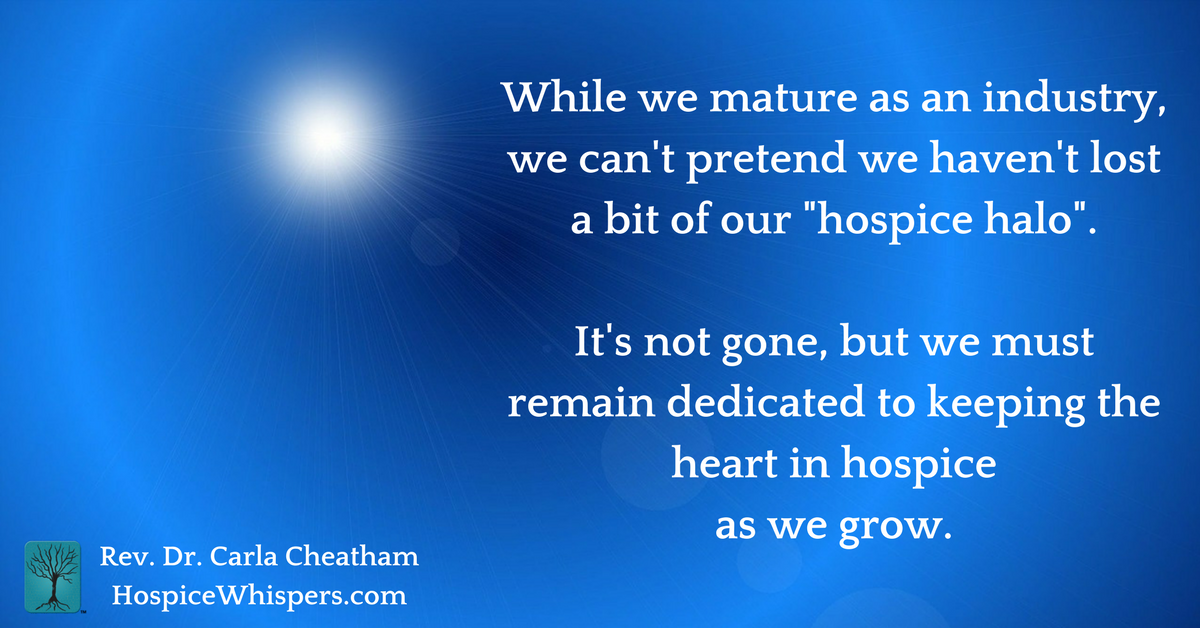As hospice and palliative care matures as a field, we will naturally face growing pains, which can be traumatic for the patients and families who fall through our cracks. In this 3-part series on Changing the Narrative Around “Bad Deaths”, I’ll look at some of the issues, how we can respond, and how professionals and lay persons can all work to make a difference.
Part I–The Dynamics We Face
As a hospice chaplain, bereavement counselor, and collector and teller of stories, I hear a lot of awful ones about bad deaths, made much more traumatic by the fact that they need not have been, for anyone involved.
My colleagues and I absolutely cringe when we hear these stories because that’s exactly what we so very passionately dedicate our lives to prevent. It drives us nuts when it happens.
Hospice and palliative care is devoted to managing symptoms and providing comfort for not only the patient’s body but also the heart, mind, and soul of everyone involved, including family and other loved ones.
When we hear the horror stories, we often want to push back against them to defend the field and our heart’s work,
“Oh, you just had a bad palliative team, most of them are great…”
or
“If only she had received hospice care…”
Without meaning to, we deflect their very real experience and lingering pain caused by a complicated death when we do that.
They don’t care that we, the medical community, get it right for everyone else. THEIR loved one had a crappy ending, and the complicated grief of such a nightmare of sights and sounds and smells and hours to weeks of feelings of helplessness, the lingering guilt about not being able to do more and second-guessing themselves in hindsight for not pushing more, aren’t diminished by our hasty defense of the field.
We humans do this. We don’t want someone to think less of a group of people, especially our own, and so we quickly tell the person harmed that their situation is an outlier, which can leave them feeling that their grief has been diminished, brushed aside, or skimmed over and ignored.
We’re even more quick to do this about things near and dear to us or when we feel personally attacked and accused by the person speaking their truth out of their understanding of the experience.
Certainly, there are a LOT of misunderstandings lay persons sometimes have about the dying process that can play into this whole dynamic:
No, we don’t give their grandmother morphine and kill her, we finally get her out of pain and comfortable so she can finally relax, let go, and die as her body has wanted to do for hours or days.
No, we don’t let them choke to death, since most terminal secretions are simply saliva they forget or can no longer swallow, making the loud snoring sound that can alarm families and can sound like they’re strangling when they aren’t.
No, we don’t starve them or let them die of thirst, but instead protect their bodies from the food and fluid that they can no longer process and, if forced in through tubes or IVs or spoonfuls of jello, will spoil in and hurt their bellies or squeeze around their heart and lungs in fluid overload.
A lack of education and emotional support that allows families to be misinformed in these ways can be just as traumatic, and is just as much our responsibility, as actual service failures.
But what we need when we’ve experienced a trauma, and witnessing a loved one have a complicated death IS traumatic, is compassionate listening, empathy, validation of our experience, and normalization of our feelings.
“I’m so sorry that was your experience” goes a lot further than, “Oh, it usually doesn’t happen that way”.
“That never should have happened to you guys. I so wish folks had shown up better for all of you, in the way you deserved. It breaks my heart that didn’t happen for you.”
We do not need someone to explain to us, at least at first, why we’re wrong and why what we experienced isn’t what happened. Maybe down the road they can hear possible alternative explanations to their situation, but in the acute stages of grief we’re usually not ready to hear it without feeling the other person is gaslighting us, denying our experience and pain.
We must be honest that failures do happen in our field.
And, let’s be clear, sometimes we really DO drop the ball, and badly!:
The doctor can’t say the words, “It’s time to talk about hospice” and keeps pushing with treatments that lead to more suffering, false hope, and less quality time with loved ones before the time of death.
A nurse is having a bad day or bad life and isn’t as compassionate and patient as is needed and deserved in delivering information to loved ones about what’s going on, or gets curt and rude when asked questions or defensive when challenged for more explanation or help.
A staff doesn’t provide adequate pain management or other symptom control and a person is left suffering while loved ones look on in helpless horror.
A hospice drops the ball or has their nurses and nurse aids carrying way too high of a caseload and the staff doesn’t show up, or a pharmacy doesn’t deliver the right meds or do so timely, or a social worker is on vacation and there is no backup to help with VA insurance paperwork, or the medical equipment company brings the wrong or faulty equipment, or the doctor doesn’t prescribe enough meds, or the chaplain prays according to your religion but calls the patient by the wrong name the whole time.
We screw up, we have service failures. It’s gonna happen even to the best of agencies.
Poorly-trained, poorly equipped, and flat-out dysfunctional teams that have no business being in business DO exist. Yes, they are the exception and not the rule, but to deny their existence is to deserve the loss of our halo. We only get to keep it if we acknowledge that we’re imperfect and continue to work our butts off to make our industry ever better.
But there is hope, and it’s us!
There are things all of us–1) loved ones of a patient that had a bad experience and want to see that never happen to anyone else, 2) lay persons who want to take action to make things better before they and their loved ones enter end of life care, and 3) professionals who desperately want our field to continue to live up to the halo effect we’ve carried for decades–can do to make a difference.
In the next post, I’ll share more about this whole issue and the chance to re-story the bad endings that have happened, even as we work to make certain such moments never happen again. In the final post of this series, I’ll share a list of resources and advocacy opportunities that we can all engage in to make everyone’s story better in the end.
For now, please hear me.
If your loved one had anything other than what you or they would call a good death, I’m so sorry. You have my commitment to keep working to help make sure those moments don’t happen for others; not that it makes your pain any better, but perhaps it can ease your heart just a little, especially if you can take part in making a difference, and you can. I’ll show you how.
For the dedicated men and women who are hospice and palliative professionals, or other healthcare providers, our halo is not gone just because some of our colleagues, and even we at times, fail to get it right by omission or commission.
It may have slipped, gotten a little tarnish over time, and be in need of repair, but we are still hospice angels in the best possible way who bring peace and comfort and quality of life and death to millions of persons across the globe.
With continued vigilance and effort, we will only get better with time and industry maturity, so long as we do not lose our hope or our incredibly tenacity that would make Dame Saunders proud.
For what it’s worth.
If you’ve experienced the death of a loved one, I speak to the topic of finding meaning and even sorting through the trauma of a loved one having a less than picture-perfect death among other topics in Sharing Our Stories: A Hospice Whispers Grief Support Workbook. Designed for individuals or groups, the eBook version is only $7.99 and is available through Amazon.
Peace,
Carla
 Rev. Carla Cheatham, MA, MDiv, PhD, TRT has served hospices as a chaplain and bereavement coordinator. She’s the Section Leader for the Spiritual Caregivers Section of the National Hospice and Palliative Care Organization and an adjunct professor at the Seminary of the Southwest. Through her Carla Cheatham Consulting Group, Carla provides training and consulting for professional caregivers nationwide. She is the author of Hospice Whispers: Stories of Life and its companion volume, Sharing Our Stories: A Hospice Whispers Grief Support Workbook. Her next book, On Showing Up with Suffering: Others’ and Our Own, is set to publish in 2017.
Rev. Carla Cheatham, MA, MDiv, PhD, TRT has served hospices as a chaplain and bereavement coordinator. She’s the Section Leader for the Spiritual Caregivers Section of the National Hospice and Palliative Care Organization and an adjunct professor at the Seminary of the Southwest. Through her Carla Cheatham Consulting Group, Carla provides training and consulting for professional caregivers nationwide. She is the author of Hospice Whispers: Stories of Life and its companion volume, Sharing Our Stories: A Hospice Whispers Grief Support Workbook. Her next book, On Showing Up with Suffering: Others’ and Our Own, is set to publish in 2017.



Leave a Reply